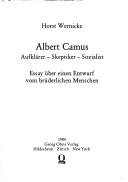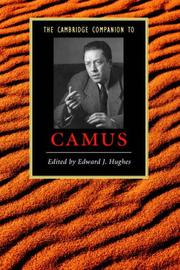| Listing 1 - 10 of 35 | << page >> |
Sort by
|
Book
ISBN: 9050183514 Year: 1997 Publisher: Amsterdam Balans
Abstract | Keywords | Export | Availability | Bookmark
 Loading...
Loading...Choose an application
- Reference Manager
- EndNote
- RefWorks (Direct export to RefWorks)
Camus, Albert --- Camus, Albert, --- Kami︠u︡, Alʹber, --- Kʻa-mu, --- Kamu, --- Chia-mou, --- Jiamou, --- Chia-miu, --- Jiamiu, --- Kʻa-miu, --- Kamiu, --- Albīr Kāmī, --- Kāmī, Albīr, --- Kāmū, Albīr, --- Ḳami, Alber, --- Kamy, Albert, --- Kāmyu, Ālper, --- Kāmyu, Ālpark, --- Mathe, Albert, --- Bauchart, --- Saetone, --- קאמי, אלבר, --- كامو، البير، --- كامي، ألبير --- کامو، البرت، --- کامو، آلبر --- Kamju, Al'ber
Book
ISBN: 9023236025 9789023236023 Year: 2000 Publisher: Assen Van Gorcum
Abstract | Keywords | Export | Availability | Bookmark
 Loading...
Loading...Choose an application
- Reference Manager
- EndNote
- RefWorks (Direct export to RefWorks)
Camus, Albert --- Criticism and interpretation. --- Kamju, Al'ber --- Camus, Albert, --- Kami︠u︡, Alʹber, --- Kʻa-mu, --- Kamu, --- Chia-mou, --- Jiamou, --- Chia-miu, --- Jiamiu, --- Kʻa-miu, --- Kamiu, --- Albīr Kāmī, --- Kāmī, Albīr, --- Kāmū, Albīr, --- Ḳami, Alber, --- Kamy, Albert, --- Kāmyu, Ālper, --- Kāmyu, Ālpark, --- Mathe, Albert, --- Bauchart, --- Saetone, --- קאמי, אלבר, --- كامو، البير، --- كامي، ألبير --- کامو، البرت، --- کامو، آلبر
Book
ISBN: 9781405159302 1405159308 1405159316 9781405159319 1444321870 1444303279 9786612683329 1282683322 1444303287 Year: 2009 Publisher: Oxford Blackwell
Abstract | Keywords | Export | Availability | Bookmark
 Loading...
Loading...Choose an application
- Reference Manager
- EndNote
- RefWorks (Direct export to RefWorks)
Camus, Albert, --- Camus, Albert. --- Camus, Albert --- Kami︠u︡, Alʹber, --- Kʻa-mu, --- Kamu, --- Chia-mou, --- Jiamou, --- Chia-miu, --- Jiamiu, --- Kʻa-miu, --- Kamiu, --- Albīr Kāmī, --- Kāmī, Albīr, --- Kāmū, Albīr, --- Ḳami, Alber, --- Kamy, Albert, --- Kāmyu, Ālper, --- Kāmyu, Ālpark, --- Mathe, Albert, --- Bauchart, --- Saetone, --- קאמי, אלבר, --- كامو، البير، --- كامي، ألبير --- کامو، البرت، --- کامو، آلبر --- Kamju, Al'ber

ISBN: 2252018690 9782252018699 Year: 1977 Volume: 54 Publisher: Paris Klincksieck
Abstract | Keywords | Export | Availability | Bookmark
 Loading...
Loading...Choose an application
- Reference Manager
- EndNote
- RefWorks (Direct export to RefWorks)
Fiction --- French literature --- Camus, Albert --- Camus, Albert, --- Style --- Literary style --- Literary style. --- Kamju, Al'ber --- Kami︠u︡, Alʹber, --- Kʻa-mu, --- Kamu, --- Chia-mou, --- Jiamou, --- Chia-miu, --- Jiamiu, --- Kʻa-miu, --- Kamiu, --- Albīr Kāmī, --- Kāmī, Albīr, --- Kāmū, Albīr, --- Ḳami, Alber, --- Kamy, Albert, --- Kāmyu, Ālper, --- Kāmyu, Ālpark, --- Mathe, Albert, --- Bauchart, --- Saetone, --- קאמי, אלבר, --- كامو، البير، --- كامي، ألبير --- کامو، البرت، --- Style. --- کامو، آلبر --- Camus, Albert, - 1913-1960 - Literary style --- Camus, Albert, - 1913-1960

ISBN: 2706100915 Year: 1977 Publisher: Grenoble Presses universitaires de Grenoble
Abstract | Keywords | Export | Availability | Bookmark
 Loading...
Loading...Choose an application
- Reference Manager
- EndNote
- RefWorks (Direct export to RefWorks)
Camus, Albert --- Camus, Albert, --- Language --- Camus, Albert. --- Language. --- Kamju, Al'ber --- Kami︠u︡, Alʹber, --- Kʻa-mu, --- Kamu, --- Chia-mou, --- Jiamou, --- Chia-miu, --- Jiamiu, --- Kʻa-miu, --- Kamiu, --- Albīr Kāmī, --- Kāmī, Albīr, --- Kāmū, Albīr, --- Ḳami, Alber, --- Kamy, Albert, --- Kāmyu, Ālper, --- Kāmyu, Ālpark, --- Mathe, Albert, --- Bauchart, --- Saetone, --- קאמי, אלבר, --- كامو، البير، --- كامي، ألبير --- کامو، البرت، --- کامو، آلبر

ISBN: 3487074605 Year: 1984 Publisher: Hildesheim Olms
Abstract | Keywords | Export | Availability | Bookmark
 Loading...
Loading...Choose an application
- Reference Manager
- EndNote
- RefWorks (Direct export to RefWorks)
Camus, Albert --- Camus, Albert, --- Criticism and interpretation --- Criticism and interpretation. --- Kamju, Al'ber --- Kami︠u︡, Alʹber, --- Kʻa-mu, --- Kamu, --- Chia-mou, --- Jiamou, --- Chia-miu, --- Jiamiu, --- Kʻa-miu, --- Kamiu, --- Albīr Kāmī, --- Kāmī, Albīr, --- Kāmū, Albīr, --- Ḳami, Alber, --- Kamy, Albert, --- Kāmyu, Ālper, --- Kāmyu, Ālpark, --- Mathe, Albert, --- Bauchart, --- Saetone, --- קאמי, אלבר, --- كامو، البير، --- كامي، ألبير --- کامو، البرت، --- کامو، آلبر
Book
ISBN: 2827101068 2252018569 9782827101061 Year: 1976 Volume: 22 Publisher: Fribourg Ed. universitaires
Abstract | Keywords | Export | Availability | Bookmark
 Loading...
Loading...Choose an application
- Reference Manager
- EndNote
- RefWorks (Direct export to RefWorks)
Camus, Albert --- Camus, Albert, --- Philosophy --- Philosophy. --- Kamju, Al'ber --- Kami︠u︡, Alʹber, --- Kʻa-mu, --- Kamu, --- Chia-mou, --- Jiamou, --- Chia-miu, --- Jiamiu, --- Kʻa-miu, --- Kamiu, --- Albīr Kāmī, --- Kāmī, Albīr, --- Kāmū, Albīr, --- Ḳami, Alber, --- Kamy, Albert, --- Kāmyu, Ālper, --- Kāmyu, Ālpark, --- Mathe, Albert, --- Bauchart, --- Saetone, --- קאמי, אלבר, --- كامو، البير، --- كامي، ألبير --- کامو، البرت، --- کامو، آلبر --- Camus, Albert, - 1913-1960 - Philosophy --- Camus, Albert, - 1913-1960

ISBN: 9780521549783 9780521840484 0521549787 0521840481 1139001396 1139817302 9781139001397 Year: 2007 Publisher: Cambridge : Cambridge University Press,
Abstract | Keywords | Export | Availability | Bookmark
 Loading...
Loading...Choose an application
- Reference Manager
- EndNote
- RefWorks (Direct export to RefWorks)
Albert Camus is one of the iconic figures of twentieth-century French literature, one of France's most widely read modern literary authors and one of the youngest winners of the Nobel Prize for Literature. As the author of L'Etranger and the architect of the notion of 'the Absurd' in the 1940s, he shot to prominence in France and beyond. His work nevertheless attracted hostility as well as acclaim and he was increasingly drawn into bitter political controversies, especially the issue of France's place and role in the country of his birth, Algeria. Most recently, postcolonial studies have identified in his writings a set of preoccupations ripe for revisitation. Situating Camus in his cultural and historical context, this 2007 Companion explores his best-selling novels, his ambiguous engagement with philosophy, his theatre, his increasingly high-profile work as a journalist and his reflection on ethical and political questions that continue to concern readers today.
Camus, Albert --- Camus, Albert, --- Kami︠u︡, Alʹber, --- Kʻa-mu, --- Kamu, --- Chia-mou, --- Jiamou, --- Chia-miu, --- Jiamiu, --- Kʻa-miu, --- Kamiu, --- Albīr Kāmī, --- Kāmī, Albīr, --- Kāmū, Albīr, --- Ḳami, Alber, --- Kamy, Albert, --- Kāmyu, Ālper, --- Kāmyu, Ālpark, --- Mathe, Albert, --- Bauchart, --- Saetone, --- קאמי, אלבר, --- كامو، البير، --- كامي، ألبير --- کامو، البرت، --- Criticism and interpretation. --- Philosophy. --- Romance Literatures --- French Literature --- Languages & Literatures --- کامو، آلبر --- Kamju, Al'ber
Book
ISBN: 9789004302334 9789004302341 9004302344 9004302336 9004302336 Year: 2015 Volume: 18 Publisher: Leiden Boston
Abstract | Keywords | Export | Availability | Bookmark
 Loading...
Loading...Choose an application
- Reference Manager
- EndNote
- RefWorks (Direct export to RefWorks)
Camus, Philosophe: To Return to our Beginnings is the first book on Camus to read Camus in light of, and critical dialogue with, subsequent French and European philosophy. It argues that, while not an academic philosopher, Albert Camus was a philosophe in more profound senses looking back to classical precedents, and the engaged French lumières of the 18th century. Aiming his essays and literary writings at the wider reading public, Camus’ criticism of the forms of ‘political theology’ enshrined in fascist and Stalinist regimes singles him out markedly from more recent theological and messianic turns in French thought. His defense of classical thought, turning around the notions of natural beauty, a limit, and mesure makes him a singularly relevant figure given today’s continuing debates about climate change, as well as the way forward for the post-Marxian Left. This book is also available in paperback.
Philosophy, French. --- Camus, Albert, --- French philosophy --- Camus, Albert --- Kamju, Al'ber --- Kami︠u︡, Alʹber, --- Kʻa-mu, --- Kamu, --- Chia-mou, --- Jiamou, --- Chia-miu, --- Jiamiu, --- Kʻa-miu, --- Kamiu, --- Albīr Kāmī, --- Kāmī, Albīr, --- Kāmū, Albīr, --- Ḳami, Alber, --- Kamy, Albert, --- Kāmyu, Ālper, --- Kāmyu, Ālpark, --- Mathe, Albert, --- Bauchart, --- Saetone, --- קאמי, אלבר, --- كامو، البير، --- كامي، ألبير --- کامو، البرت، --- کامو، آلبر
Book

ISBN: 2757418742 2757403648 Year: 2017 Publisher: Villeneuve d'Ascq : Presses universitaires du Septentrion,
Abstract | Keywords | Export | Availability | Bookmark
 Loading...
Loading...Choose an application
- Reference Manager
- EndNote
- RefWorks (Direct export to RefWorks)
Albert Camus a vingt-deux ans quand il commence à écrire régulièrement dans ses « Cahiers » ; il ne cessera pas jusqu’à sa mort. Il en préparait alors la publication ; elle sera posthume, sous le titre de Carnets. Ces textes, aussi inclassables que divers (laboratoire de l’œuvre, « choses vues », notes de lectures, impressions de voyages, réflexions philosophiques et, de plus en plus vers la fin de sa vie, notations intimes) sont souvent cités ; ils n’avaient jamais été étudiés en tant que tels. Ils le sont ici, par des chercheurs d’horizons divers, qui interrogent les modalités et les enjeux de cette écriture très spécifique. Les Carnets prennent ainsi toute leur place dans l’œuvre camusienne, dont ils mettent au jour les ressorts secrets. Au cœur de cette écriture fragmentaire, l’exigence artistique de Camus est aussi manifeste qu’ailleurs ; et c’est à ses Carnets qu’en 1937 - il a alors vingt-quatre ans - il confie sa certitude, qui ne se démentira pas : « Écrire, ma joie profonde ! ». Lire les Carnets se révèle indispensable pour qui veut vraiment connaître Camus...
Camus, Albert, --- Notebooks, sketchbooks, etc. --- Camus, Albert --- Kamju, Al'ber --- Kami︠u︡, Alʹber, --- Kʻa-mu, --- Kamu, --- Chia-mou, --- Jiamou, --- Chia-miu, --- Jiamiu, --- Kʻa-miu, --- Kamiu, --- Albīr Kāmī, --- Kāmī, Albīr, --- Kāmū, Albīr, --- Ḳami, Alber, --- Kamy, Albert, --- Kāmyu, Ālper, --- Kāmyu, Ālpark, --- Mathe, Albert, --- Bauchart, --- Saetone, --- קאמי, אלבר, --- كامو، البير، --- كامي، ألبير --- کامو، البرت، --- کامو، آلبر --- Philosophy --- Literature (General) --- écriture --- Carnets d'écrivains --- genèse --- écriture de l'intime
| Listing 1 - 10 of 35 | << page >> |
Sort by
|

 Search
Search Feedback
Feedback About
About Help
Help News
News